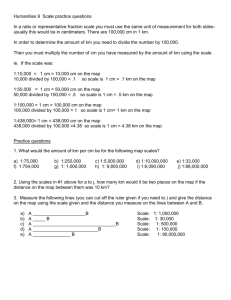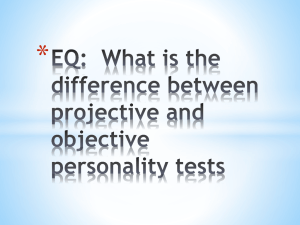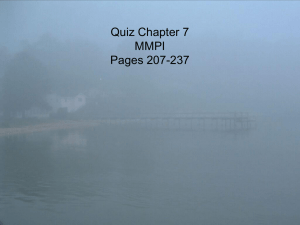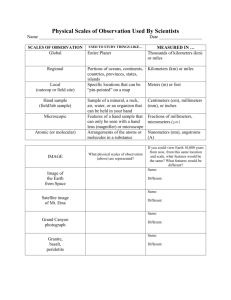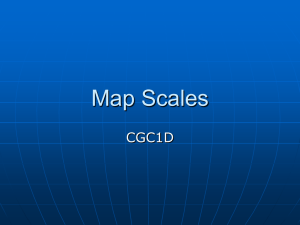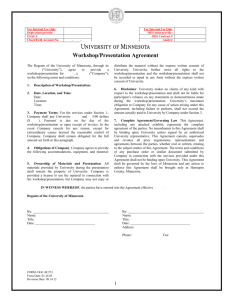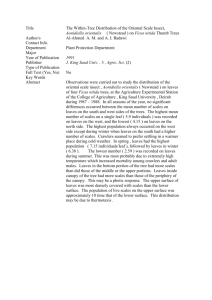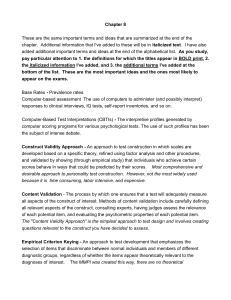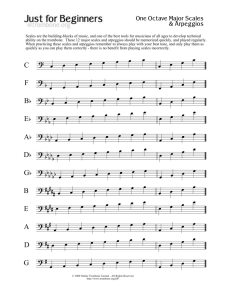The MMPI-‐2 Restructured Clinical (RC) Scales IntroducXon
advertisement
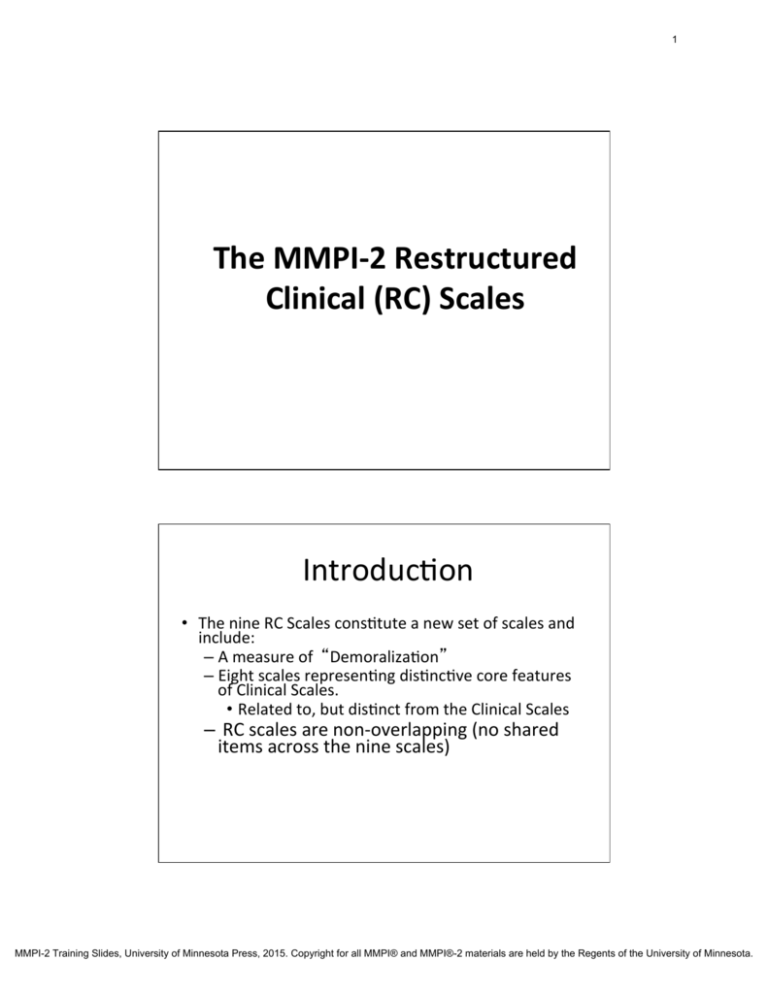
1 The MMPI-­‐2 Restructured Clinical (RC) Scales Introduc)on • The nine RC Scales cons)tute a new set of scales and include: – A measure of “Demoraliza)on” – Eight scales represen)ng dis)nc)ve core features of Clinical Scales. • Related to, but dis)nct from the Clinical Scales – RC scales are non-­‐overlapping (no shared items across the nine scales) MMPI-2 Training Slides, University of Minnesota Press, 2015. Copyright for all MMPI® and MMPI®-2 materials are held by the Regents of the University of Minnesota. 2 Why Restructure the Clinical Scales? • Strengths of Clinical Scales: – Empirical keying – Extensive empirical valida)on – Extensive prac)cal experience • Ques)ons about Clinical Scales: – – – – – Higher than expected scale intercorrela)ons Extensive item overlap Ques)onable “subtle” items Problems of convergent and discriminant validity Lack of theory Cri)cism of the MMPI/MMPI-­‐2 • Item overlap and shared variance across the clinical scales – Leads to mul)ple scale eleva)on and aRenuated discriminate validity especially in seSngs marked by high levels of psychopathology. • Factor analysis of the clinical scales revealed a large first factor variously aRributed to – Acquiescence or social desirability – Welsh’s first factor “general distress” or “general maladjustment”. • The shared factor is an ar)fact of empirical scale construc)on. MMPI-2 Training Slides, University of Minnesota Press, 2015. Copyright for all MMPI® and MMPI®-2 materials are held by the Regents of the University of Minnesota. 3 Developing the RC Scales Steps in RC Scale construc)on: 1. Capturing Demoraliza)on 2. Iden)fying dis)nc)ve “core” components of Clinical Scales 3. Construc)ng Seed Scales for each core component 4. Deriving final RC Scales Developing the RC Scales • Step 1: Capturing Demoraliza)on – Related to “MMPI-­‐2 first factor” – Welsh’s A – General Maladjustment MMPI-2 Training Slides, University of Minnesota Press, 2015. Copyright for all MMPI® and MMPI®-2 materials are held by the Regents of the University of Minnesota. 4 Developing the RC Scales • Hypotheses about Demoraliza)on: – Many Demoraliza)on items in MMPI-­‐2 Clinical Scales – Clinically significant, worth measuring – Equivalent to general Pleasant-­‐Unpleasant or Sad-­‐Happy dimension of self-­‐reported affect – Shared by most clinical condi)ons, but not dis)nc)ve of any one emo)onal/psychological disorder. Developing the RC Scales • Hypotheses about Demoraliza)on (con)nued): – Posi)vely correlated with Nega)ve Ac)va)on, including anxiety – Nega)vely correlated with Posi)ve Ac)va)on: increasing risk for depression – Recoverable through factor analyses of combined items of Clinical Scales 2 and 7 MMPI-2 Training Slides, University of Minnesota Press, 2015. Copyright for all MMPI® and MMPI®-2 materials are held by the Regents of the University of Minnesota. 5 Developing the RC Scales • Comple)on of Step 1: – Iden)fica)on of set of Demoraliza)on items • Factor analysis of items from clinical scales 2 and 7 revealed one large factor of items from both scales (demoraliza)on) and items unique to scale 2 and unique to scale 7, the core components of the respec)ve scales. Developing the RC Scales • Hypotheses about dis)nc)ve core components: – Demoraliza)on not dis)nc)ve core of any Clinical Scale – Removal of Demoraliza)on items from Clinical Scales necessary to obtain more convergently and discriminantly valid measures MMPI-2 Training Slides, University of Minnesota Press, 2015. Copyright for all MMPI® and MMPI®-2 materials are held by the Regents of the University of Minnesota. 6 Developing the RC Scales • Working hypotheses about dis)nc)ve core components (con)nued): -­‐ Item factor analyses of each individual Clinical Scale combined with Demoraliza)on items will reveal Demoraliza)on factor and factor represen)ng dis)nc)ve core of Clinical Scale in ques)on Developing the RC Scales • Comple)on of Step 2: Iden)fica)on of dis)nc)ve core components (factors) in each Clinical Scale by combining the items from each scale with the demoraliza)on items in a factor analysis. MMPI-2 Training Slides, University of Minnesota Press, 2015. Copyright for all MMPI® and MMPI®-2 materials are held by the Regents of the University of Minnesota. 7 Developing the RC Scales • Dis)nc)ve core of Clinical Scale 1: Soma)c Complaint items • Dis)nc)ve core of Clinical Scale 2: Low Posi)ve Emo)on or anhedonia items Developing the RC Scales • Dis)nc)ve core of Clinical Scale 3: Cynicism items – Reversed scored naiveté items – Scale 3 heterogeneous and other components were iden)fied. • Dis)nc)ve core of Clinical Scale 4: An)social Behavior items MMPI-2 Training Slides, University of Minnesota Press, 2015. Copyright for all MMPI® and MMPI®-2 materials are held by the Regents of the University of Minnesota. 8 Developing the RC Scales • Dis)nc)ve core of Clinical Scale 6: Items reflec)ng paranoid and persecutory idea)on items. • Dis)nc)ve core of Clinical Scale 7: items associated with Dysfunc)onal Nega)ve Emo)ons such as tension, anxiety, and nervousness. Developing the RC Scales • Dis)nc)ve core of Clinical Scale 8: items indica)ng unusual sensory experiences, disordered thinking and Aberrant experiences • Dis)nc)ve core of Clinical Scale 9: items associated with Hypomanic Ac)va)on MMPI-2 Training Slides, University of Minnesota Press, 2015. Copyright for all MMPI® and MMPI®-2 materials are held by the Regents of the University of Minnesota. 9 Developing the RC Scales • Step 3: Deriving Restructured Clinical Seed (S) Scales Developing the RC Scales • Purpose of S Scales: - Represent iden)fied Clinical Scale core components - Maximize Seed Scale dis)nc)veness - Use to develop final RC Scales MMPI-2 Training Slides, University of Minnesota Press, 2015. Copyright for all MMPI® and MMPI®-2 materials are held by the Regents of the University of Minnesota. 10 Developing the RC Scales • Comple)on of Step 3: – Iden)fica)on of Clinical Scale items adequately correlated with core for that scale and minimally correlated with core for other scales (and Demoraliza)on) – Development of 12 rela)vely brief S scales for Demoraliza)on, RC1, RC2, RC3, RC4, RC6, RC7, RC8, RC9, (seed scales also developed for Scale 5 and 0 RC5m, RC5f, RC0) Developing the RC Scales • Step 4: Deriving final RC Scales – To represent iden)fied core component of each Clinical Scale with excep)on of Scales 5 and 0 (not measures of psychopathology) – Obtain correla)ons of all 567 MMPI-­‐2 items with all 12 S scales in four clinical samples (psychiatric men, psychiatric women, ETOH men, ETOH women) – Select item if meet all three criteria in all four samples • General: highest correla)on across all samples • Convergent: Above a threshold correla)on with seed scale • Divergent: Below a threshold correla)on with other seed scales MMPI-2 Training Slides, University of Minnesota Press, 2015. Copyright for all MMPI® and MMPI®-2 materials are held by the Regents of the University of Minnesota. 11 Developing the RC Scales • Addi)onal refinements: – Special analyses to make core features of RC7 and RC9 more dis)nc)ve – Internal consistency analyses to iden)fy unsa)sfactory items – Remove or reassign items on basis of correla)ons with external criteria Scale Names, Abbreviations and Number of Items MMPI-2 Training Slides, University of Minnesota Press, 2015. Copyright for all MMPI® and MMPI®-2 materials are held by the Regents of the University of Minnesota. 12 RC Scales • Shorter and more homogenous than component clinical scale • No item overlap between the RC scales • RC scale names describe phenomena not diagnoses. Summary of Findings Reported in Tellegen et al. (2003) • Reliability – Though they are substan)ally shorter, the RC scales generally have alphas comparable to or beRer than the clinical scales. – Test-­‐retest reliability is higher for many RC scales compared with their clinical scale counter-­‐parts. – Removal of common factor variance does not aRenuate the RC scales’ reliability. • RC Scale/Clinical Scale Correla)ons – The RC scales are correlated substan)ally with their clinical scale counter-­‐parts. – The expected excep)on is Scale 3 and RC3Cyn. MMPI-2 Training Slides, University of Minnesota Press, 2015. Copyright for all MMPI® and MMPI®-2 materials are held by the Regents of the University of Minnesota. 13 Convergent and Discriminant Validity: Conclusions • The RC scales (in comparison with the clinical scales) show substan)al improvement in their discriminant validity. • The RC scales ojen show substan)al improvement in their convergent validity as well. • Discriminant validity is most enhanced for RC scales measuring non-­‐affect variables (i.e., ac)ng out and psychosis). • Extrac)on of common variance associated with demoraliza)on substan)ally reduces inter-­‐ correla)ons among the RC scales. MMPI-­‐2 RC Scales Interpreta:on MMPI-2 Training Slides, University of Minnesota Press, 2015. Copyright for all MMPI® and MMPI®-2 materials are held by the Regents of the University of Minnesota. 14 RC Scale Interpreta)on: General • Like content scales, items are very “transparent” – so pay par)cular aRen)on to the validity scales. • Standard scores are uniform T scores. • Clinically significant eleva)on begins at T-­‐score 65. • Low scores on RC3 are interpretable. • For remaining RC Scales liRle consistent evidence for low score interpreta)on. RC Scale Interpreta)on: Demoraliza)on (RCd) • Should always be star)ng point for interpreta)on. • Overall indica)on of individual’s current level of emo)onal (dys)func)oning. • Substan)al eleva)on will likely co-­‐occur with diffuse eleva)on paRern on Clinical Scales. MMPI-2 Training Slides, University of Minnesota Press, 2015. Copyright for all MMPI® and MMPI®-2 materials are held by the Regents of the University of Minnesota. 15 RC Scale Interpreta)on: Demoraliza)on (RCd) • Elevated scores indicate: – General demoraliza)on – Complaints of anxiety and depression – Insecurity – Pessimism – Low self-­‐esteem – Tension – Demoraliza)on leads to expecta)ons and/or percep)ons of failure. – If T-­‐score > 75, individual may be experiencing significant emo)onal turmoil and report feeling overwhelmed and incapable of coping with current circumstances. RC Scale Interpreta)on: Soma)c Complaints (RC1) • Elevated scores indicate: – Large number of soma)c complaints – Preoccupa)on with bodily concerns – Presenta)on of diffuse soma)c concerns – Complaints of: • Fa)gue • Weakness • Chronic pain – Soma)c responses to stress or inter-­‐personal difficul)es MMPI-2 Training Slides, University of Minnesota Press, 2015. Copyright for all MMPI® and MMPI®-2 materials are held by the Regents of the University of Minnesota. 16 RC Scale Interpreta)on: Soma)c Complaints (RC1) • If T-­‐score > 75: – a highly unusual degree and combina)on of soma)c complaints, even for someone with genuine health problems – Individual is highly preoccupied with perceived physical maladies and will likely reject any psychological interpreta)ons of their sources. RC Scale Interpreta)on: Low Posi)ve Emo)ons (RC2) • Elevated scores indicate: Increased risk for depression Insecurity Pessimism Passive social withdrawal Anhedonia Report: • Boredom • Isola)on • Low energy – Uncomfortable with leadership or decision-­‐making – Low need and expecta)ons for achievement – – – – – – MMPI-2 Training Slides, University of Minnesota Press, 2015. Copyright for all MMPI® and MMPI®-2 materials are held by the Regents of the University of Minnesota. 17 RC Scale Interpreta)on: High Scores on Cynicism (RC3) • Elevated scores indicate: – Belief that others: • Look out only for self interests • Will try to take advantage • Therefore, are untrustworthy – Individual avoids situa)ons where might be taken advantage of – Difficul)es forming interpersonal rela)onships – Expect to fail, blame others when this occurs RC Scale Interpreta)on: Low Scores on Cynicism (RC3) • T-­‐scores < 40: – Naïve – Gullible – Overly trus)ng MMPI-2 Training Slides, University of Minnesota Press, 2015. Copyright for all MMPI® and MMPI®-2 materials are held by the Regents of the University of Minnesota. 18 RC Scale Interpreta)on: An)social Behavior (RC4) • Elevated scores indicate: – An)-­‐social behavior – Interpersonal aggression – Cri)cal – Angry – Argumenta)ve – Difficulty conforming to social norms and expecta)ons. – Legal difficul)es – Increased risk for substance abuse and sexual ac)ng out. – Conflictual rela)onships – Poor achievement RC Scale Interpreta)on: Ideas of Persecu)on (RC6) • Elevated scores indicate: Significant paranoid idea)on View others as source of malevolent threat View selves as vic)ms of others’ ill inten)ons Overtly suspicious and, as a result, experience difficul)es forming trus)ng rela)onships – Feel mistreated, picked upon – – – – MMPI-2 Training Slides, University of Minnesota Press, 2015. Copyright for all MMPI® and MMPI®-2 materials are held by the Regents of the University of Minnesota. 19 RC Scale Interpreta)on: Ideas of Persecu)on (RC6) • If T-­‐score > 75 – Reports prominent persecutory idea)on. – Likely experiencing paranoid delusional thinking – May be symptoma)c of psycho)c disorder such as Schizophrenia or Delusional Disorder. RC Scale Interpreta)on: Dysfunc)onal Nega)ve Emo)ons (RC7) • Elevated scores indicate: – – – – – – – – – – Increased risk for anxiety or anxiety-­‐related disorder Rumina)on Excessive worry Sensi)vity toward cri)cism Perceive cri)cism where none intended Brooding Preoccupa)on with self-­‐perceived failure Guilt Insecurity Intrusive, unwanted idea)on MMPI-2 Training Slides, University of Minnesota Press, 2015. Copyright for all MMPI® and MMPI®-2 materials are held by the Regents of the University of Minnesota. 20 RC Scale Interpreta)on: Aberrant Experiences (RC8) • Elevated scores indicate: – Report of unusual thought processes and percep)ons: • Bizarre perceptual experiences up to hallucina)ons • Delusional beliefs such as thought broadcas)ng • Moderate eleva)ons (T=65-­‐74) may indicate schizotypal characteris)cs. • Higher eleva)ons (T>75) suggest possible schizophrenia, delusional disorder, or schizoaffec)ve disorder. RC Scale Interpreta)on: Hypomanic Ac)va)on (RC9) • Elevated scores indicate: – – – – – – – – – Grandiose self-­‐view General excita)on Sensa)on-­‐seeking Risk-­‐taking Poor impulse control Euphoria Decreased need for sleep Racing thoughts Aggressive tendencies • If RC9 > 75, ac)ve manic or hypomanic episode may be present. MMPI-2 Training Slides, University of Minnesota Press, 2015. Copyright for all MMPI® and MMPI®-2 materials are held by the Regents of the University of Minnesota.
